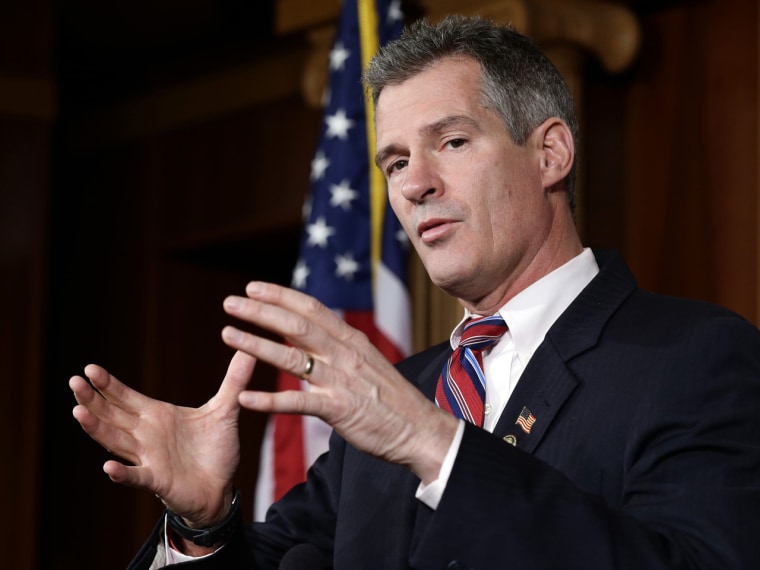Deciding to run for office usually requires some substantial ties to a state--but not for all politicians.
With his announcement this week he’ll run against Gov. John Hickenlooper (D-Colo.), former Cranston, R.I., Republican mayor Steve Laffey became the latest politician to eye a run for office very soon after being on the ballot in another state.
Laffey moved to Colorado in 2010, after he unsuccessfully challenged then-GOP Sen. Lincoln Chafee in the primary. Now, Laffey says his adopted new home, where he and his wife own a 36 acre “Irish Animal” ranch in Ft. Collins, Colo., is where they call home, and that his prior runs in the Ocean State shouldn’t matter.
It was a cross-country roadtrip that led his family to Colorado, and becoming frustrated with the increasingly liberal fiscal policies in Rhode Island. Laffey and his family decided to sell their home, and they lived in a Residence Inn for a month before they found their new home.
Laffey calls it a “traumatic experience” but says Colorado is his new home, and it’s where he wants to serve. He said he doesn't believe that voters in the Centennial State will hold it against him.
“I don’t think anybody cares in Colorado,” Laffey said in an interview. “People vote for who they think is in their best interests.”
Laffey first has to get through a GOP primary that is set to include former Rep. Tom Tancredo, among others, before he even gets the chance to face-off against Hickenlooper--an uphill task in itself.
But if history is any guide one of Laffey’s biggest problems is that he’s tried before to run for office elsewhere. State shopping usually doesn't work out well for hopeful pols. As in Laffey’s case, there may be other reasons why they moved to the state, but the branding has already been done. Other politicians have moved simply to try to win an office, handily losing as they’ve been slammed as political opportunists. The carpetbagger charges write themselves, and tenuous ties to a state are easy for opponents to attack.
There’s a long list of politicians who found themselves in similar positions--having represented one state, losing, but trying out another--and all were ultimately unsuccessful:
- After Tennessee Republican Sen. Bill Brock lost his 1976 re-election bid, he would go on to serve as both the U.S. Trade Representative and Labor Secretary in the Reagan administration. But, still bit by the political bug, in 1994 he decided to run for Senate--in Maryland. He won the GOP primary but lost to Democrat Paul Sarbanes in the general election.
- New York Republican Sen. James Buckley was defeated in 1976 by Democrat Daniel Patrick Moynihan. Four years later, Buckley was living in neighboring Connecticut and ran for, and won the GOP Senate nomination, but lost the general election to Democrat Chris Dodd.
- Rep. Ben “Cooter” Jones, of “Dukes of Hazzard” fame, was a Democratic congressman from Georgia for four years, until he lost in a primary thanks to redistricting. In 2002 he challenged Rep. Eric Cantor (R-Va.), but lost handily.
- Conservative activist Alan Keyes made multiple presidential runs, but also was the GOP nominee for Senate in Maryland in 1988. In 2004, he was drafted for a futile run against Barack Obama in Illinois despite never having lived there.
Some other politicians pondered campaigns in different states, but ultimately decided against it.
- When Rep. Dennis Kucinich’s (D-Ohio) district was eliminated in the 2012 redistricting, and he lost an intraparty primary to fellow Rep. Marcy Kaptur, the former Cleveland mayor floated running for Congress--in Washington state’s new congressional district. He ultimately decided against it.
- Former Tennessee Democratic Rep. Harold Ford Jr. (now an msnbc contributor) lost his 2006 bid for U.S. Senate, but in 2010 openly mulled a bid for Senate in New York.
- Former Sen. Bob Smith (R-N.H.) was defeated in the 2002 GOP primary by John Sununu, and just two years later had headed for warmer Florida weather where he announced he was running in the 2004 Senate primary. Polling poorly, he dropped out. Smith did the same thing in 2010, but withdrew before the primary.
But even with the poor track record, Laffey’s not the only person eyeing a run in a different state this year. Others to keep an eye on:
- After former Sen. Scott Brown (R-Mass.) passed on a special election bid, he--and the NRSC--are stoking the flames that he could run against Sen. Jeanne Shaheen (D-N.H.) next year in New Hampshire.
- Former Rep. Artur Davis (R-Ala.) was seen as a rising star in the party, but after he lost a 2010 gubernatorial bid to a more liberal candidate, grew disillusioned with the Democratic Party and announced last year he was joining the GOP and has talked about running for Congress in Virginia.
